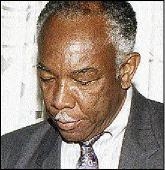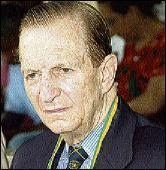PUBLIC AFFAIRS: Staffing the public sector
Published: Sunday | December 13, 2009

A side view of the Ministry of Finance in Kingston, home of the Treasury, where decisions were made about an ambitious plan to save the financial sector from meltdown in the 1990s. - File
The recent resignations, constructive dismissals and debate about appointments in the world of finance and police services beg the question as to the viability of the recruitment process to fill these positions. Within the last two years there have been separations from the post of financial secretary, governor of the Bank of Jamaica, ministers in the Ministry of Finance, and the commissioner of police.
Some might argue that this is to be expected given that the Government now in power was in opposition for some 18 years. The fact that many of the changes were from appointments made within the period since the present Government took office, and the frequent laments about poor performance, suggest that the recruitment process in general needs to be assessed. The emphasis here is on process, as distinct from the actions of any prime minister or minister of finance.
Consider first of all the appointment of minister of finance. We have, since independence, appointed five ministers of finance from the legal profession - Donald Sangster, David Coore, Eric Bell, Hugh Small and a short stint from former prime minister P.J. Patterson. Three had advanced-degree qualifications in the social sciences and business - former prime minister Edward Seaga, Omar Davies, and the incumbent Audley Shaw - and a commissioned land surveyor, Seymour Mullings.
finance professionals


Bell (left) and Mullings (right).
I believe that most, if not all, of the holders of the position of minister of finance are able people; however, almost all came to the Ministry of Finance not at all steeped in the world of government finance. Nothing is wrong with this per se if they are supported by a cadre of able, experienced, government-finance professionals. This has oftentimes been true, although some very able public servants with little knowledge about central banking have also been appointed governor of the Bank of Jamaica. In short, Jamaica does not appear to have viewed the business of monetary and fiscal policy, of debt management and taxation, of budgets and deficit financing, as requiring leadership by experienced, trained professionals. It should also be noted that increasingly, ministers and in particular the minister of finance, is seen as the head and lead professional in his ministry. It is he, some argue, who should lead the technical negotiations with multilateral organisations or be the principal loan negotiator.
In Jamaica, the minister of finance must be chosen from the ranks of elected members of parliament (MPs). Nothing is wrong with this in and of itself, save to say that the process of electing MPs does not guarantee that a suitable candidate will always be available from the elected ranks of the governing party. A simple solution is to allow the prime minister the option of selecting the minister of finance, as with other ministers, from the Senate.
I am not advocating an increase in the number of ministers that can be appointed from the Senate but simply recognising that finance, as with law, requires experience and professionalism and, therefore, the prime minister should not be constrained to select only from among MPs. I also recognise that this does not guarantee that a suitable candidate would be selected, although it makes the selection of an ideal candidate more likely.
Trinidad and Tobago has enshrined this option in their constitution by a clause that states: "A minister who is a member of the House of Representatives and a minister who is a senator have the right to attend any sitting of the Senate or the House of Representatives, respectively." I recommend that the right of the prime minister to select the minister of finance from the Senate be included in the changes to the Constitution.
Recent changes and appointments of financial secretary and governor of the Bank of Jamaica suggest that the minister of finance is attempting to shore up the technical depth of his support staff.
The prime minister has also named a committee to oversee a complete restructuring of the staffing and functions of central government and key government agencies. Although the restructuring exercise is primarily a result of funding problems faced by the Government, its need reflects a lack of planning and poor recruitment in the past.
The Public Service Commission has responsibility for appointments, promotions, discipline, retirement and termination in the civil service, and has specific guidelines on matters like the importance of seniority and training in the evaluation of staff. Dating back to 1961, with antecedents before 1961, the Public Service Commission Regulations that detail the commission's functions is a very daunting document.
staff assessment


Sangster (left) and
Seaga (right).
A proactive Public Service Commission along with the Public Service Establishment that is embedded in the Ministry of Finance should be continuously assessing the staffing complement of the civil service and the merger or removal when necessary of government agencies.
The complexities of the Public Service Regulations, given that the goal is to get the restructuring in place for the next Budget necessitate, I suspect, a special entity. This doubtless motivated the prime minister's decision not to use the Public Service Commission or the Ministry of Finance to carry out the restructuring exercise. I am, however, concerned that the dictates as laid down in the Public Service Regulations will make the task of the Restructuring Committee far more difficult than at first realised.
Consider, for example, Clause 17 (2) of the Public Service Regulations: "For promotion to a post involving work of a routine nature more weight may be given to seniority than where the work involves greater responsibility and initiative. Merit and ability shall be given more weight progressively as the work involves a higher degree of responsibility and initiative." Using this as a guideline in a massive restructuring exercise requires time-consuming appraisal, and yet not to use it would appear to disregard a fundamental principle of employment in the civil service.
My view is that the restructuring of the civil service now being carried out should have, as its prime goal, the creation of a civil service committed to excellence, but consistent with the imperatives of funding. Retention of the best should rank high on the outcomes of the cost-cutting exercise. The urgency of the need to reduce public expenditure must, unfortunately, take precedence over the need to change both the spirit and the letter of the Public Service Regulations, but the need for change in this area should rank high on the list of changes to our Constitution.
Another area where recruitment, training and the instilling of appropriate values and attitudes is vital to performance is the Jamaica Constabulary Force. The Police Service Commission is again searching for a new commissioner. The Police Service Commission, like the Public Service Commission, operates under 1961 regulations. The Police Service Commission, in a 20-page document with 59 numbered paragraphs, spells out how to go about appointments, promotions, discipline, suspension and dismissal in the police force. Despite this document, or perhaps because of it, the Jamaica Constabulary Force is assumed by many to be corrupt and inefficient. The recommendations of the Strategic Review Committee on the police force emphasise the need for improvement in recruitment, training and changes in values and attitudes. In other words, the Police Service Commission Regulations, with its cumbersome disciplinary process and commitment to promotion from within the ranks of the force, simply neglected to ensure that the core values of integrity and honesty and the key requirements of efficiency and attention to detail were routine to the force.
important positions
It is instructive that retired police officers are not sought after for key managerial positions and are rarely to be found occupying important positions in the government or the private sector. This is in stark contrast to the army whose retired officer corps has served recently as commissioner of police, permanent secretary, director of elections and director of corrections, to mention only a few of the high-profile government positions. There are also, of course, many retired army officers in significant positions in the private sector. The absence of the retired police officer corps is also noticeable in the non-security private sector. The reasons for this must lie in differences in recruitment and training supported by a culture that inculcates the 'right' set of values and attitudes.
The career civil servant with a distinguished 30-year service in the Government should be a sought-after individual when he reaches the allowable retirement option, with 10 to 15 more years of normal working life. Unfortunately, the reputation of the civil ser-vice is so tarnished that this rarely happens.
The set of conditions and rules that govern recruitment, training and the instilling of the right values in the public sector needs immediate reform. All good prime ministers and chief executives know that without a good team of support staff, their performance will be nothing more than grand statements and exhortations. How to ensure that the requisite professional staff in the public sector is always up to the task requires immediate changes to the recruitment and training processes that now prevail.
Dr Marshall Hall is a former CEO and professor. Feedback may be sent to columns@gleanerjm.com.
















